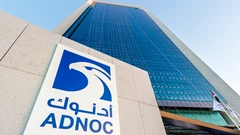E.ON study shows ways to ramp-up hydrogen economy in Germany
The ramp-up of the hydrogen economy in Germany is slowing down – even if the overall positive development continues, according to the third H2-Bilanz published on Thursday by E.ON.
The study, based on data from the Institute of Energy Economics at the University of Cologne (EWI), shows that planned hydrogen production capacity by 2030 has increased from 8.1 gigawatts in February 2023 to 8.7 gigawatts in August 2023. Even though that is still a slight upward trend, the increase is nowhere near as strong as in the months from July 2022 to February 2023, the study found.
The German government’s goal in the national hydrogen strategy is to have at least 10 gigawatts of electrolysis capacity installed in Germany by 2030.
In the case of H2 infrastructure, the number of pure hydrogen pipelines in operation in Germany has remained almost the same. There is a clearly positive development in the plans for a hydrogen network, the planned length of which has almost doubled: the construction of 5,708 km hydrogen pipelines by 2035 is now planned, compared to only 2,813 km that were announced back in February of this year. E.ON attributes this to the fact that the construction of a hydrogen infrastructure has gained momentum in recent months with the decision to create a hydrogen core network.
For E.ON, this is a further indication that clear political and regulatory frameworks are directly accelerating the ramp-up of the hydrogen economy. In many areas, however, these are currently not sufficient to limit existing technology, demand, and infrastructure risks nor to make the costs of producing green hydrogen, in particular, competitive. For this reason, E.ON has commissioned the consulting firm Frontier Economics to investigate various options for accelerating the hydrogen ramp-up in Germany.
“Acceleration is something that we urgently need in the hydrogen ramp-up in Germany. The discrepancy between planned projects and final investment decisions is far too great. We need instruments to speed up the hydrogen ramp-up,” Patrick Lammers, Member of the Board of Management of E.ON, said in a statement.
“That’s why we at E.ON have initiated a study that identifies various options. In this way, we want to provide concrete impetus and support policymakers in creating the necessary framework conditions for the success of the hydrogen economy,” he added.
The new study focuses on five different instruments. As the green gas quota is increasingly a subject of political discussion and since the EU already imposes quotas for hydrogen in industry and in the transport sector which must be met in the member states, Frontier Economics has analysed this instrument in depth. One argument in favor of a green gas quota is that it can be implemented without the use of direct public funds and enables a reliably plannable ramp-up of green gases. A green gas quota would also be a concrete political signal for the future of green gases as a sensible addition to electrification.
However, the study also points out some disadvantages. For example, the green gas quota creates only a relative certainty of quantity for green gases, as it is based on total gas sales. This is especially true for green hydrogen. In addition, a quota for obliged entities would entail the risk of not being able to procure sufficient hydrogen. In general, the introduction of a green gas quota – like other instruments – would be associated with additional costs. From E.ON’s point of view, the instrument should therefore initially be used cautiously in order to minimise financial burdens and risks and to promote acceptance.
The study shows that there is no one-size-fits-all solution for a rapid hydrogen ramp-up. However, E.ON and Frontier Economics were able to identify the advantages and disadvantages of the various instruments and how they would have to be designed to minimise the disadvantages – which instrument is most appropriate depends on the specific premises and policy objectives.
KEEPING THE ENERGY INDUSTRY CONNECTED
Subscribe to our newsletter and get the best of Energy Connects directly to your inbox each week.
By subscribing, you agree to the processing of your personal data by dmg events as described in the Privacy Policy.
More technology news

SLB wins service contracts for all Petrobras offshore fields in Brazil

Energy efficiency is the decisive factor in electric motor choice, finds ABB research

SLB Capturi completes the world’s first industrial-scale CCS plant at a cement facility

ADNOC launches $80+ billion XRG for low-carbon energy and chemicals

ENEC and ADNOC to advance nuclear technology for energy efficiency

COP29 Presidency hosts inaugural Digitalisation Day

SLB launches Stream high-speed intelligent telemetry for drilling complex wells

Vici Energy joins the United Nations Global Compact

TAQA launches next generation inflow control technology
















